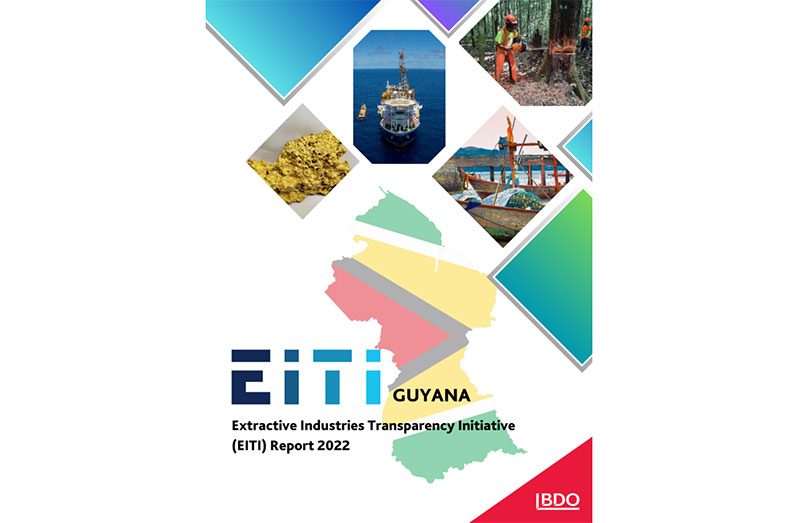Ensuring transparency and accountability as the oil and gas sector reshapes the nation’s future
DID you know that artisanal, small, and medium-scale miners account for the majority of gold production in Guyana? This fact might not be well-known among many Guyanese, but it’s just one of the insights gleaned from the country’s annual Extractive Industries Transparency Initiative (EITI) report.
As the oil and gas industry emerges as the latest addition to Guyana’s extractive sectors, the excitement around it is palpable. With job opportunities on the rise and companies eager to establish their presence, everyday Guyanese are increasingly questioning how this new sector will impact their lives. Central to these concerns is the need for effective monitoring of the industry. Fortunately, our leaders remain vigilant, overseeing every aspect of our natural resources through the EITI framework.
Guyana has embraced the EITI platform to report on its mining, oil and gas, forestry, and fisheries sectors, publishing five EITI reports since becoming an implementing country. The Guyana EITI (GYEITI) is dedicated to enhancing transparency regarding extractive contracts and beneficial ownership and informing policy debates on the oil and gas sector and the management of the country’s sovereign wealth fund. With the most recent EITI report now released, Pepperpot Magazine spoke to Johann Earle, the Public Affairs Officer at the Ministry of Natural Resources, attached to the GYEITI Secretariat, about the vital role that every Guyanese plays in the very big picture of our extractive industries.
Simply put, EITI is an international effort to ensure the fair and honest use and distribution of a nation’s natural resources. As Earle shared, “EITI is a global initiative that started in 2003 after a conference in London of world leaders. There needed to be a mechanism that would ensure that countries with natural resources have a way to monitor and manage those resources for the benefit of their citizens,” he said.
This initiative emerged from the recognition of a troubling disconnect between a nation’s wealth and the poverty experienced by its people. “There was a mismatch. How could a country that is rich have people that are poor? That’s why EITI came about,” he shared.
Although Guyana joined EITI in 2017, the groundwork was laid much earlier, with the then-government expressing interest in becoming a member over a decade ago during its oil exploration phase. Earle recounted that,”Guyana officially joined EITI in 2017. However, back in 2010, the government signalled its intent to join because of its oil exploration activities.”
Guyana’s EITI membership in 2017 established a model for accountability and reporting across the extractive industries. In keeping with EITI mandates, all extractive industries in Guyana are required to be part of the country’s annual report. “Guyana was required to produce an annual report, which is now open to the public on our website. This latest edition is for 2022,” he explained.
He also noted that, “EITI provides a two-year window for report completion. So, for 2022, we have until the end of 2024 for the final report.”
EITI reports provide a wealth of data illustrating the contributions of various sectors.
“There are numerous graphs, tables, and charts that depict the contributions of the extractive sectors. You’ll see what gold contributed to in 2022, along with comparisons to the previous year,” Earle noted. He further added that, “The information in the report, the numbers and figures, have all been peer-reviewed and double-checked,” he stated.
This reliability is further reinforced by the role of an independent consultancy firm. Earle explained, “It’s a structured process. First, there’s an independent consultancy firm, which conducts the reviews. It’s managed through an open tender process overseen by the Guyana Tender Board,” he said.
This independent firm then sets out to gather information from companies all across Guyana in the various extractive sectors like gold, forestry, and oil and gas. The meticulous data collection process involves collaboration with various agencies. “They send out information templates to all government agencies related to all relevant extractive companies. When those companies and government agencies submit their numbers, they are compiled, and then we can reconcile what was paid and what was received,” Earle elaborated.
Reconciliation is also a critical aspect of this process. “Reconciliation simply means checking to see what causes any inconsistencies. Yes, it could be corruption, but it doesn’t necessarily indicate wrongdoing,” he clarified, reinforcing that not every discrepancy suggests misconduct.
Although Guyana has faced some challenges in keeping up with the mandates, Earle says that moving forward, the GYEITI is optimistic. The most recent report highlights various interesting developments and new trends across sectors.
The report serves as more than research; it also helps Guyana plot our next steps forward. “Every country must develop a work plan that guides implementation timelines and targets,” Earle explained.
As Guyana navigates its emerging oil and gas sector, the voices of citizens, small miners, and organisations like GYEITI will be crucial in ensuring that the country’s rich natural resources are managed transparently and equitably, ultimately benefitting all Guyanese.




.jpg)









